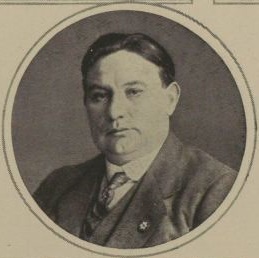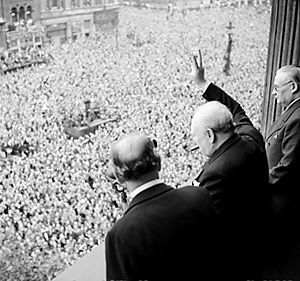Ernest Bevin facts for kids
Quick facts for kids
Ernest Bevin
|
|
|---|---|
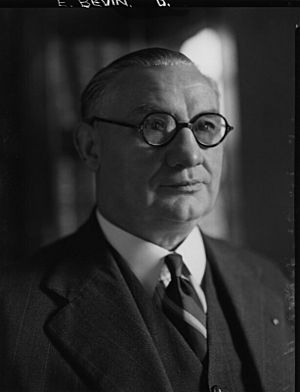 |
|
| Lord Keeper of the Privy Seal | |
| In office 9 March 1951 – 14 April 1951 |
|
| Prime Minister | Clement Attlee |
| Preceded by | The Viscount Addison |
| Succeeded by | Richard Stokes |
| Secretary of State for Foreign Affairs | |
| In office 27 July 1945 – 9 March 1951 |
|
| Prime Minister | Clement Attlee |
| Preceded by | Anthony Eden |
| Succeeded by | Herbert Morrison |
| Minister of Labour and National Service | |
| In office 13 May 1940 – 23 May 1945 |
|
| Prime Minister | Winston Churchill |
| Preceded by | Ernest Brown |
| Succeeded by | Rab Butler |
| Member of Parliament for Woolwich East |
|
| In office 23 February 1950 – 14 April 1951 |
|
| Preceded by | George Hicks |
| Succeeded by | Christopher Mayhew |
| Member of Parliament for Wandsworth Central |
|
| In office 22 June 1940 – 3 February 1950 |
|
| Preceded by | Harry Nathan |
| Succeeded by | Richard Adams |
| General Secretary of the Transport and General Workers' Union | |
| In office 1 January 1922 – 27 July 1945 |
|
| Preceded by | New office |
| Succeeded by | Arthur Deakin |
| Personal details | |
| Born | 9 March 1881 Winsford, Somerset, England |
| Died | 14 April 1951 (aged 70) London, England |
| Political party | Labour |
| Spouse |
Florence Anne Townley
(m. 1906) |
| Children | 1 |
Ernest Bevin (born March 9, 1881 – died April 14, 1951) was an important British politician and a strong leader for workers. He helped start the powerful Transport and General Workers' Union (TGWU) in 1922. He led this union until 1945.
During World War II, he was the Minister of Labour. He made sure Britain had enough workers for both the army and factories. He did this with very few strikes. After the war, he became the Foreign Secretary from 1945 to 1951. This was his most important job.
As Foreign Secretary, Bevin helped get money from the Marshall Plan to rebuild Europe. He was strongly against communism. He also helped create NATO, a military alliance for safety. During his time, British India became independent, splitting into India and Pakistan. The Mandate for Palestine also ended, leading to the creation of Israel.
Contents
Early Life and Work
Ernest Bevin was born in a small village called Winsford in Somerset, England. His mother was Diana Bevin, but his father is not known. When he was eight, his mother died. He then lived with his half-sister's family in Copplestone, Devon.
He didn't go to school for very long. He left school when he was eleven years old. He started working as a laborer, then as a lorry driver in Bristol. He joined a group called the Bristol Socialist Society. In 1910, he became a leader in a dockworkers' union. By 1914, he was a national organizer for the union.
Bevin was a big, strong man. He had a very strong accent from the West Country of England. Sometimes, people found it hard to understand him. He learned to speak well from being a Baptist preacher. He later became a full-time worker for unions.
He married Florence Townley in 1906. They had one daughter named Queenie. Florence Bevin later received an honor called Dame Commander of the Order of the British Empire.
Leading the Transport Union
In 1922, Bevin helped create the Transport and General Workers' Union (TGWU). This union quickly became the biggest in Britain. As its General Secretary, he became one of the most important leaders for workers in the country. He was a strong voice for unions within the Labour Party.
Bevin was against communism and direct protests. He believed in getting better conditions for workers through talks. He took part in the British General Strike in 1926, but he wasn't very excited about it. He preferred to negotiate.
He didn't always trust politics in Parliament. But he was a member of the Labour Party from the start. He tried to become a Member of Parliament (MP) in 1918 but lost. He didn't get along well with the first Labour Prime Minister, Ramsay MacDonald.
Bevin believed in helping his union members directly. For example, in the late 1930s, he helped get paid holidays for many more workers. This led to a law in 1938 that gave paid holidays to about 11 million workers.
Views on Foreign Policy
In the 1930s, Bevin became more interested in how Britain dealt with other countries. He was strongly against fascism, which is a type of strict government. He also opposed Britain's policy of trying to keep peace by giving in to fascist powers. This was called "appeasement."
In 1935, he argued that Fascist Italy should be punished for invading Abyssinia (now Ethiopia). He criticized those in the Labour Party who wanted peace at any cost. He helped make sure the Labour Party voted for sanctions against Italy.
After this vote, the Labour leader, George Lansbury, resigned. Clement Attlee became the new leader. Bevin strongly supported Attlee in the years that followed.
Wartime Minister of Labour
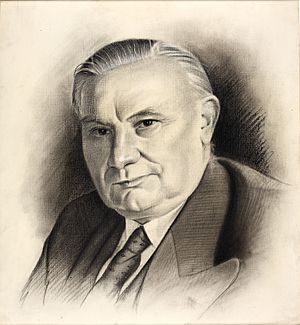
In 1940, Winston Churchill formed a special government with all major parties to lead Britain during World War II. Churchill was impressed by Bevin. He made Bevin the Minister of Labour and National Service. At this time, Bevin was not an MP. So, he quickly became an MP for Wandsworth Central.
Bevin was given full control over Britain's workers. He used this power to help win the war. He also wanted to make unions stronger for the future. He once joked that he would be at the Ministry of Labour for a very long time. The system he put in place lasted for many years after the war.
During the war, Bevin sent nearly 48,000 young men who were supposed to join the army to work in coal mines instead. These workers were known as the "Bevin Boys." He also improved wages and working conditions for many workers. He planned how millions of soldiers and war workers would return to civilian jobs after the war. Bevin stayed Minister of Labour until 1945. On VE Day, he stood next to Churchill as they waved to crowds.
Foreign Secretary Role
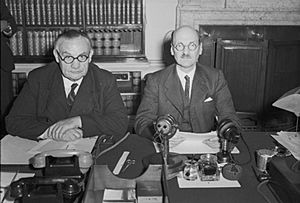
After the 1945 election, Clement Attlee became Prime Minister. He chose Bevin to be the Foreign Secretary. This meant Bevin was in charge of how Britain dealt with other countries.
Bevin was known for being very direct. He was also very dedicated to his work. He read a lot and made his own decisions. He was very good at standing up for Britain's views.
Bevin had a strong dislike for communists. He saw them as lazy thinkers who tried to cause trouble in unions. This view influenced his foreign policy. He was also known for being suspicious and sometimes prejudiced against certain groups.
Working with the United States
Bevin did not automatically agree with everything the United States did. He wanted Britain to be seen as strong and important. He felt that some of Britain's problems were due to America's actions. His goal was to get the US to support Britain's policies. He believed Britain deserved American help after its sacrifices in the war.
Once, an American visitor asked Bevin why he had a painting of King George III behind his desk. Bevin replied, "He's my hero. If he hadn't been so stupid, you wouldn't have been strong enough to come to our rescue in the War."
Britain's Money Problems
In 1945, Britain was almost broke because of the war. But it still had a huge army and air force. Bevin was key in getting a large loan of $3.75 billion from the United States. This loan was very important to prevent Britain from going bankrupt.
Britain also received money from the Marshall Plan from 1948 to 1950. This money did not have to be paid back. It helped Britain modernize its businesses and remove trade barriers.
Building European Alliances
Bevin wanted to bring Western European countries together in a military alliance. This was at the start of the Cold War. He helped create the Dunkirk Treaty with France in 1947. He also signed the Treaty of Brussels in 1948. This treaty brought Britain, France, Belgium, the Netherlands, and Luxembourg together for safety.
These steps led to the formation of NATO in 1949. NATO was mainly created to protect against the Soviet Union. It also helped its members work together and modernize their armies.
Changes in the British Empire
Bevin was practical about the British Empire. He understood that some places wanted to rule themselves. He was part of the government that quickly approved Britain leaving India in 1947. This led to India and Pakistan becoming independent.
However, Britain still kept control of some areas, especially in the Middle East and Africa. Bevin believed that Britain's colonies had resources that could make Britain strong. He thought these resources could help Britain stay independent from the US and the Soviet Union.
The Cold War and Nuclear Weapons
Bevin remained strongly against communism and the Soviet Union. In 1946, during a meeting, the Soviet Foreign Minister kept attacking British ideas. Bevin became so frustrated that he shouted, "I've had enough of this I 'ave!"
He strongly encouraged the United States to take a firm stance against communism. He also supported Britain sending troops to the Korean War. NATO and the Marshall Plan were largely thanks to Bevin's efforts.
Bevin and Prime Minister Attlee secretly decided to build a British atomic bomb. Bevin believed it was important for Britain's prestige and safety. He famously said, "We've got to have this thing over here whatever it costs.... We've got to have the bloody Union Jack flying on top of it."
Palestine and Israel
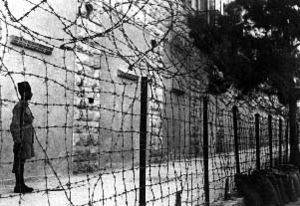
Bevin was Foreign Secretary when the British rule in Palestine ended. This led to the creation of Israel. Britain wanted a peaceful solution and to avoid people being forced to move. However, Bevin struggled to achieve these goals.
He made some comments that many found insensitive. Some critics even accused him of being against Jewish people. For example, when the US asked Britain to let 100,000 Jewish refugees into Palestine, Bevin said that Americans didn't want "too many Jews in New York." His biographer, Alan Bullock, said Bevin was not personally anti-Semitic.
Britain was weak financially and relied on American money. This made it hard for Bevin to resist US pressure on Palestine. In 1947, Jewish and Arab leaders could not agree on a plan for Palestine. Bevin then decided to hand the problem over to the United Nations.
The UN proposed dividing Palestine. Bevin felt this plan was unfair to the Arabs. Fighting between Jewish and Arab groups grew. Britain left Palestine in May 1948. This led to the creation of Israel and the start of the 1948 Arab-Israeli War.
Bevin was very angry about attacks on British troops by some Jewish groups. Secret files show that some groups even tried to kill Bevin in 1946.
Later Life and Legacy
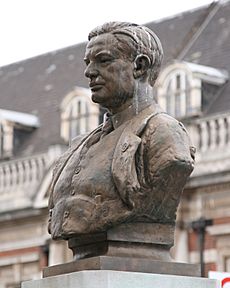
Bevin's health got worse. In March 1951, he reluctantly accepted a less demanding job as Lord Privy Seal. He joked, "I am neither a Lord, nor a Privy, nor a Seal." He died from a heart attack the next month, in April 1951. His ashes are buried in Westminster Abbey.
Ernest Bevin was offered many honors during his life, but he turned them all down.
How People Remember Bevin
Historians have different views on Ernest Bevin as Foreign Secretary. Some, like his biographer Alan Bullock, see him as one of Britain's greatest diplomats. They say he controlled foreign policy and had a clear vision. They believe he successfully made Britain a close ally of the United States. He also pushed the US to take a leading role in the world through the Truman Doctrine, the Marshall Plan, and NATO.
However, other historians have a different view. They see Bevin as too focused on being anti-Communist. They argue that he missed chances for Britain to lead in Europe. They suggest that Britain became too dependent on the United States under his leadership.
See also
 In Spanish: Ernest Bevin para niños
In Spanish: Ernest Bevin para niños
- Aneurin Bevan, another important Labour government minister who had different political views from Bevin.
- Ernest Bevin Academy
- History of trade unions in the United Kingdom
- SS Exodus
- Information Research Department (IRD)
 | Janet Taylor Pickett |
 | Synthia Saint James |
 | Howardena Pindell |
 | Faith Ringgold |


